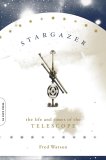Summary | Excerpt | Reviews | Beyond the Book | Readalikes | Genres & Themes | Author Bio

Critics' Opinion:
Readers' Opinion:
First Published:
Jul 2005, 360 pages
Paperback:
Jun 2006, 352 pages
 Book Reviewed by:
Book Reviewed by:
BookBrowse Review Team
Buy This Book
As the last day of the symposium wore on, participants began to
take stock. They had witnessed for themselves the state of the art of
telescope-making at the turn of a new millennium. They had seen a vision of the
future, with a football stadium-sized telescope harvesting the secrets of the
Universe, and perhaps discovering everything there is to be known. But what they
had not been given was any sense of how the telescope had found its way to this
point in its development—how, as it approached its 400th birthday, it had been
shaped by the dreams and aspirations of earlier generations of astronomers and
sculpted by the technological realities they faced. History had played no part
in these proceedings. And, while that was entirely understandable in such a
futuristic, space-age gathering, it had left the symposium with an air of
clinical soullessness.
It was history that finally restored a sense of proportion to
the symposium and put humanity back on to the agenda. But it was history of a
different kind: modern-day history, intertwined with recent political turmoil.
The last presentation in the adaptive optics conference—almost
the last of the whole symposium—was given by
two professors from a former communist bloc country. In
faltering English, one slowly read a prepared text while the other illustrated
it with old-fashioned overhead projector slides—a dramatic contrast to the slick
presentations most speakers had conjured up from their laptop computers. The
subject matter was of the highest quality, describing plans for adaptive optics
on a proposed 25 metre telescope in the ELT class. But when, at the end of what
had clearly been an ordeal, they were questioned about the time-scale on which
this telescope would be built, they simply smiled and shrugged. 'We don't know,'
they said. 'There are no prospects that it will ever be funded.'
Within the previous year, perhaps half the audience would have
received electronic mail from academic colleagues in this same eastern bloc
nation asking for help with the barest necessities of life. Food, clothing,
books. As a result, many were aware of the economic hardships these two
scientists would have left behind at home. They might not have been paid for
weeks—maybe even months.
The reminder had a dramatic effect. The air of embarrassed
tolerance that had pervaded the room during the stumbling presentation quickly
gave way to a wave of genuine sympathy. Thoughts of one-upmanship in the
super-telescope league suddenly seemed uncomfortable—and rather unimportant.
Thoughts of telescope closures also subsided as new possibilities for innovative
and economical modes of operation began to suggest themselves. And, slowly at
first, the preoccupation with aperture began to evaporate. The excitement of OWL
remained undiminished, but its potential to rise above national boundaries
seemed to take on new significance. Perspectives were restored; the fever
abated. At last, 'Power Telescopes and Instrumentation into the New Millennium'
had begun to find its soul.
Thus was the present and future of the telescope mapped out in
the closing hours of Munich's epoch-making conference. A little while later,
after all the goodbyes had been said, and promises to keep in touch and exchange
information made, the last few delegates left the International Congress Centre.
The late afternoon sunshine welcomed them back into the real world, inspired, no
doubt, by what they had heard, and perhaps a little wiser. It felt pleasantly
warm as they headed for home.
From Stargazer by Fred Watson, pages viii - x of the Prologue, and pages 1-17 of Chapter 1. Copyright Fred Watson. All rights reserved. Excerpt reproduced by permission of Da Capo Press.





The House on Biscayne Bay
by Chanel Cleeton
As death stalks a gothic mansion in Miami, the lives of two women intertwine as the past and present collide.

The Flower Sisters
by Michelle Collins Anderson
From the new Fannie Flagg of the Ozarks, a richly-woven story of family, forgiveness, and reinvention.

The Funeral Cryer by Wenyan Lu
Debut novelist Wenyan Lu brings us this witty yet profound story about one woman's midlife reawakening in contemporary rural China.
Your guide toexceptional books
BookBrowse seeks out and recommends the best in contemporary fiction and nonfiction—books that not only engage and entertain but also deepen our understanding of ourselves and the world around us.